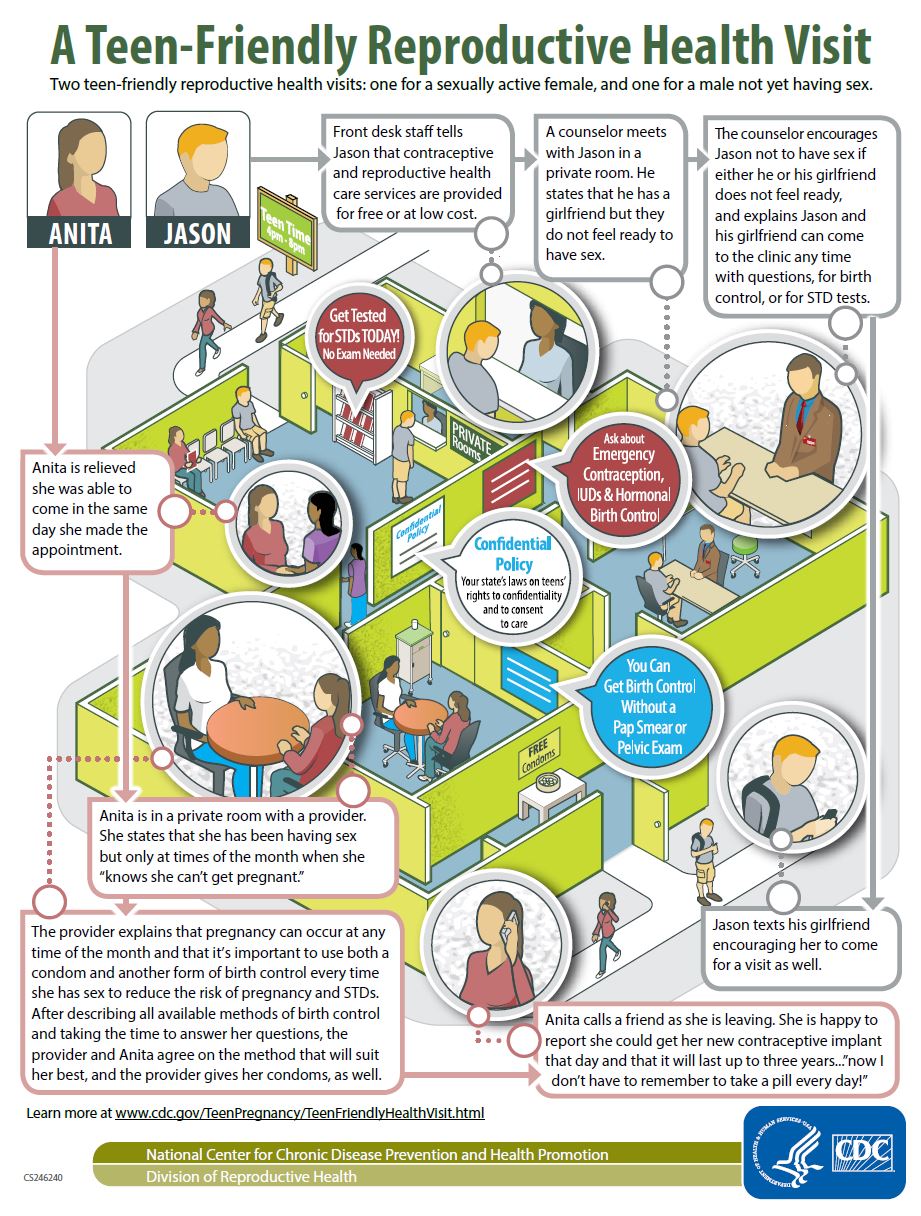At a glance
As a health care provider, you can play a role in supporting adolescent health and well-being by providing equitable access to high-quality sexual and reproductive health (ASRH) services.
Overview
Ensure you are providing the recommended ASRH clinical services and youth-friendly practices. Also, check out the Infographic: A Teen-Friendly Reproductive Health Visit.
Confidentiality
- Teens receive clear information about their state's laws governing the rights of adolescent patients to confidentiality and to consent to care or treatment. A teen's health information cannot be shared with anyone—including parents or guardians—without the teen's written permission, unless required by law or if the health care provider is concerned the teen might harm him- or herself or someone else.
- Billing procedures should maintain teen's confidentiality. If this is not possible, the provider or billing staff advises the teen about the potential breach of confidentiality and provides options. For example, the patient might want to pay out of pocket or look for a health center that provides confidential care for teens.
Privacy
- The provider has a counseling area to discuss sensitive topics with teens that provides visual and auditory privacy. It is important that other health care staff or clients cannot hear the conversation or see who is participating in the conversation.
- The health center has an examination room that provides visual and auditory privacy.
- At every visit, each teen patient has time alone with a provider to discuss or ask questions about contraceptive and reproductive health concerns, regardless of whether the visit is urgent or preventive.
- Staff members do not discuss teens' information in common office spaces.
- Medical records are kept secure and are accessible only to select health care staff, such as through the use of locked files, or password-protected electronic medical records.
Consent
- Teens receive clear information about informed consent. They know their right to complete and understandable information about their care and medical procedures, and their right to give permission to receive medical care related to contraceptive and reproductive health.
- Teens receive clear information that confidential contraceptive and reproductive health services are available without the need for parent or caregiver consent, consistent with state laws and regulations.
Cultural and linguistic appropriateness
- The health center environment and staff leave teen patients feeling respected and engaged in their health care.
- Culturally competent care is provided, meaning all care is sensitive to and respectful of each teen's culture, ethnicity, community values, religion, language, educational level, sex, and sexual orientation.
- The care provided addresses the unique biologic, cognitive, and psychosocial needs of adolescents.
- Conversations between teens and providers are two-way, where teens feel respected and not judged.
Comprehensive services
- Teens are informed of all contraceptive and reproductive health services available at the specific health center; a referral is provided for any contraceptive or reproductive health services that are not available at the specific health center.
- Teens' contraceptive and reproductive health needs are assessed at every visit. Counseling is provided on all methods to prevent pregnancy using a patient-centered approach that is respectful of and responsive to patients' preferences, needs, and values.
- A wide range of contraception is available via prescription or dispensed on site, including intrauterine devices (IUDs), implants, pills, the shot, patch, and ring.
- The provider promotes "dual protection": using a condom for sexually transmitted infection/human immunodeficiency virus (STI/HIV) prevention—and an effective birth control method for pregnancy prevention at the same time.
- Quick Start methods are used for initiation of hormonal contraception and IUDs, such as starting the pill or inserting the IUD on any day of the month.
- Emergency contraception is available to male and female adolescents, either by prescription, dispensed on site, or prescribed for future use.
- Female teens can receive hormonal contraception without prerequisite exams or testing, such as Pap test, pelvic exam, breast exam, or STI testing.
- Teens receive STI/HIV counseling, testing, and treatment without having an exam.
- Human papillomavirus (HPV) vaccine is available and offered when appropriate.
- Mental health, substance use, violence, and other health concerns are assessed and appropriate referrals are made.
Parent/guardian involvement
- Each teen has an opportunity for examination and counseling without parents or guardians present, and the teen's privacy is respected.
- Parents and guardians are informed of the health center's standard procedure for the provider to spend time alone with teen patients to discuss their comprehensive health and wellness.
- The provider encourages the teen to involve parents or guardians in the teen's health care decisions.
- Parents receive clear information on their teen's right to confidentiality, privacy, and informed consent.
- Parents receive medically accurate information and resources on contraceptive and reproductive health, as needed or as requested.
- Parents receive resources on parent-teen communication and adolescent health and development.
Content Source:
National Center for Chronic Disease Prevention and Health Promotion (NCCDPHP); Division of Reproductive Health
- AAP Adolescent Sexual Health Resources for Providers
- AAP Equitable Access to Sexual and Reproductive Health Care for All Youth
- Long-Acting Reversible Contraception: Specific Issues for Adolescents
- ACOG Committee Opinion No. 735: Adolescents and Long-Acting Reversible Contraception: Implants and Intrauterine Devices
- ACOG Cervical cancer screening
- AAP Emergency contraception: policy statement
- Minors and the right to consent to health care
- An Overview of Minors' Consent Law

